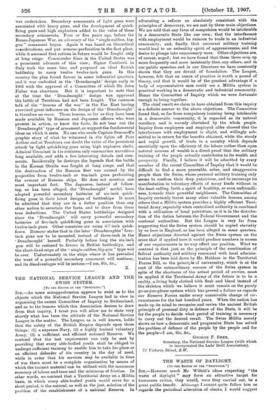THE NATIONAL SERVICE LEAGUE AND THE SWISS SYSTEM.
[To THE EDITOR OF THE "SPECTATOR.••1 Siu,—As some misapprehension appears to exist as to the objects which the National Service League had in view in organising the recent Committee of Inquiry to Switzerland, and as to the lessons which this Association desires to draw from that inquiry, I trust you will allow me to state very shortly what has been the attitude of the National Service League in the matter. The League, as is well known, holds that the safety of the British Empire depends upon three things : (1) a supreme Navy, (2) a highly trained voluntary Army, (3) a sufficient and efficient national Reserve. We contend that the last requirement can only be met by providing that every able-bodied youth shall be obliged to undergo sufficient training to enable bim to take his place as an efficient defender of his country in the day of need, while in order that his services may be available in time of war there must be a complete organisation by means of which the trained material can be utilised with the maximum economy of labour and time and the minimum of friction. In other words, we contend that a Territorial Army on a Militia basis, in which every able-bodied youth would serve for a short period, is the natural, as well as the just, solution of the problem of the establishment of a national Reserve. In
advocating a reform so absolutely consistent with the principles of democracy, we are met by three main objections. We are told that any form of compulsion would be intolerable, in a democratic State like our own; that the interference with employment would be ruinous to trade in an industrial community; and, finally, that universal military training would lead to an unhealthy spirit of aggressiveness, and the desire to plunge into unnecessary wars. Other objections are, of course, urged ; but we have found that these three crop up more frequently and more insistently than any others, and in our public speeches and in our literature we have constantly shown that they are devoid of foundation. The League, however, felt that an ounce of practice is worth a pound of theory, and that it would be of the greatest advantage if a body of representative men could see a Militia system in practical working in a democratic and industrial community. Hence the Committee of Inquiry which we were fortunate enough to bring together.
The chief result we claim to have obtained from this inquiry is a definite answer to the above objections. The Committee found that, so far from compulsory training being intolerable in a democratic community, it is regarded as its natural corollary, and is warmly cherished by the whole people. Inquiry from employers and employed alike showed that the interference with employment is slight, and willingly sub- mitted to in return for the benefits obtained, while the steady and rapid growth of trade in a country which depends essentially upon the efficiency of its labour rather than upon natural sources of wealth is a direct proof that the military training of the people actually contributes to its wealth and prosperity. Finally, I believe it will be admitted by every member of the recent Committee of Inquiry that it would be difficult to find a more peaceable, sober, and unaggressive people than the Swiss, whose personal military training only seems to confirm their deep patriotism, and to encourage its manifestation in voluntary efforts of many kinds without in the least calling forth a spirit of hostility, or even unfriendli- ness, towards their powerful neighbours. The Coinmittee of Inquiry certainly learnt many other valuable lessons, among others that a Militia system provides a highly efficient Terri- tonal Army, especially when centralised authority is combined with a utilisation of local patriotism, as it is in the distribu- tion of the duties between the Federal Government and the cantonal authorities. But the League is very far from suggesting that the Swiss system should be copied slavishly by us here in England, as has been alleged in some quarters. Hence objections directed against the Swiss system on the score that if applied here it would produce numbers in excess of our requirements in no way affect our position. What we contend is that just as the principle of the combination of federal authority and military command with local adminis- tration has been laid down by Mr. Haldane in the Territorial Forces Bill, so the princil he of universality, which is at the root of the extraordinary success of the Swiss system in spite of the shortness of the actual period of service, must be applied if the Territorial Army of the future is to be a reality, a living body clothed with flesh and blood instead of the skeleton which we believe it must remain on the purely go-as-you-please system which has proved a failure as regards our Reserve Forces under every conceivable change of cir- cumstances for the last hundred years. When the nation has made up its mind to recognise and revive the ancient British principle of personal duty in defence of the State, it will be for the people to decide what period of training is necessary to carry out the desired result. The Swiss Militia merely shows us how a democratic and progressive State has solved the problem of defence of the people by the people and for the people—I am, Sir, &c., GEORGE F. SHEE,
Secretary, the National Service League (with which is incorporated the Lads' Drill Association). . 72 Victoria Street, S.W.










































 Previous page
Previous page